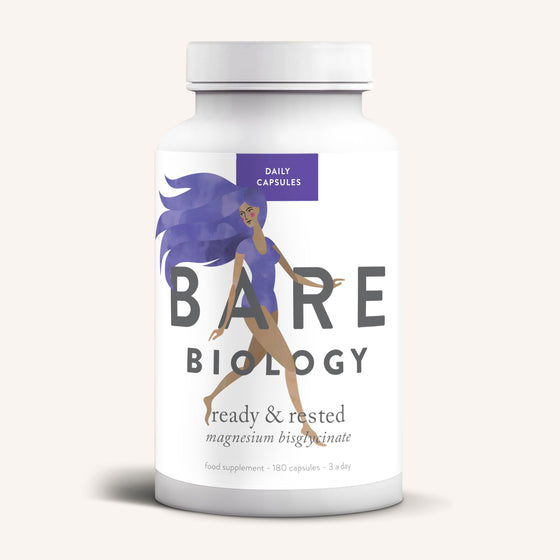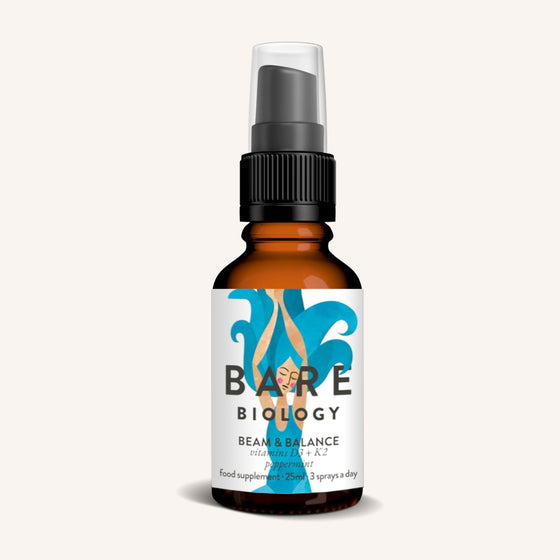Written by Melanie Lawson, founder of Bare Biology
Imagine if there were a way to lose weight, improve your intellect and reduce stress without you having to do anything. If I could bottle that and sell it, I would be a very rich lady. Well, there is, in fact, a way to do all of these things literally while you sleep.
According to nutritional therapist Rebecca Pilkington, sleep really is the magic bullet when it comes to several common physical and mental ailments. “Sleep is an opportunity for the body to restore itself,” she explained. “In fact many processes happen while we sleep, such as tissue rebuilding, the brain consolidating the knowledge from the day and toxins being eliminated. But it’s often overlooked and not prioritised, whether it is work, socialising or the kids that eat into the body’s ‘rest and recovery’ time.”
I became interested in the concept of sleep when I read Arianna Huffington’s book, ‘Thrive’. She had a life changing moment when she collapsed from exhaustion, smacked her head on her desk and ended up in hospital. All due to lack of sleep. She now puts sleep at the very top of her priority list.
If you’re to make one change this year, forget diets, forget the gym, forget all the usual stuff (except for taking omega-3 daily of course) and make it your sole mission to GET MORE SLEEP.
Sleep is for wimps, right? Wrong.
In the 70s and 80s a trend for viewing sleep as an unnecessary self-indulgence crept into our psyche and is now seen as a badge of honour. After all, we spend one third of our lives asleep. One third! It’s no wonder there’s a temptation to view it as a waste of life. Remember these famous words about how sleep is not cool?
- Margaret Thatcher - “sleep is for wimps”
- Gordon Gecko - “money never sleeps”
- Bon Jovi song - “I’ll sleep when I’m dead”
Well, Gordon, money may never sleep but you ain’t gonna make any money if you’re not getting enough sleep. Or you might make lots of money but you’ll be dead or seriously ill before you can enjoy it. Winston Churchill famously had a two-hour nap every day because he often worked all through the night. It’s also very well known that he suffered badly from depression, and his terrible sleep habits may have had a lot to do with that.
31% of drivers fall asleep at the wheel at least once in their lifetime
In the US there are 100,000 road accidents a year due to drivers nodding off at the wheel and it’s a big problem in the UK too. Our bodies need to sleep and sometimes we need it so badly that our brain forces us to sleep by nodding off involuntarily. These are known as ‘micro-sleeps’. It’s also believed that Chernobyl was largely caused by lack of sleep.
Lack of sleep is dangerous, bad for our health and bad for the economy. Productivity issues could be solved in part by a better rested workforce, and a less hungover workforce but that’s a separate subject for another day! I reckon it should also be compulsory for all politicians to sleep eight hours a night. Imagine how much better our country would be?!
Science has proven that lack of sleep makes you fat and stupid
OK, slightly alarmist and harsh subheading, but it’s true. You have a 50% increased likelihood of obesity if you sleep less than five hours a night. Why is this? I asked Rebecca to explain. She told me, “Lack of sleep increases ghrelin, the hunger hormone, meaning we are more likely to overeat and make poor food choices when we're tired, all of which can have a negative effect on our weight. Higher cortisol levels, which we notice after a poor night’s sleep, means it is also harder to lose weight as the body is likely to retain fat around the middle.”
So, you get into a cycle of eating the wrong things because you’re tired. You drink alcohol at night to reduce the effects of all the caffeine and sugar you’ve had during the day. You don’t sleep well because you’re wired and also your blood sugar is all over the place. You wake up tired and it starts all over again.
But it’s not just our waistlines that suffer, according to Rebecca. “Lack of sleep interferes with your cortisol rhythm which in turn affects everything in the body, including our thyroid, hormones, immunity, mental health, decision making, memory and concentration and even cardiovascular markers! Those sleeping less than six hours per night tend to present with higher blood pressure.”
No wonder we’re prone to making bad decisions, we’re less creative, we’re less patient and our memory is worse when we’re lacking sleep. We also look rubbish when we’re tired.
Have I convinced you to make sleep your number one priority? Try it for a week and I bet you’ll feel like a new person.
Talking to the sleep experts
Difficulty dropping off or remaining asleep is something that Palma Michel, co-founder of Profuse29 (a company that introduces mindfulness and mindful leadership to companies like London School of Economics and The Soho House Group) sees in so many of her clients.
“These days many people feel tired but wired from their days and have difficulty falling asleep at night. The moment their head hits the pillow, their thoughts go into overdrive. The other thing that is fairly common is to wake up in the early hours of the morning and struggle to go back to sleep. The mind is making incessant to-do-lists or is already holding the morning meeting.”
Sound familiar? Palma’s advice is to look at what you’re doing during the day as the first step to solving your nighttime restlessness. “When I work with clients, I normally find their difficulty with sleep is just a symptom of being stressed during the day. The more we can do to optimise our response to stress during our day, the easier it will be to find deep rest at night.”

Get on the melatonin train
Palma had another top tip that involves harnessing the body’s own sleep drug, melatonin. She said, “The best moment to go to bed is when you feel drowsy and sleepy in the evening. This is a sign that your body is producing melatonin. Melatonin is the body's natural sleep drug. Very often, we ignore these signs and continue watching TV or play with our computers as we feel the evening is the only time we have to ourselves. Melatonin is like a train, if you miss the last one, it takes a long time for the next one to arrive.”
But there is some good news for those of us who aren’t managing to catch the melatonin express. Rebecca believes you can encourage your body to make more of it through the foods you eat. She says, “It’s a good idea to have a high protein snack several hours before bedtime. This could be your evening meal. The protein will assist with the L-tryptophan production needed for melatonin and serotonin production, two hormones essential for sleep. Including some fruit with this meal will assist making the tryptophan more bio-available in the body.” What a great excuse for having a late supper!
My top tips for getting to sleep and things I’ve learned
An estimated 30% of the population suffer from some symptoms of insomnia. I too suffered from insomnia as a child and still get phases of it now. I also found the sleep deprivation that comes with having new babies made me feel like death, and for sure contributed to low immunity and depression. I used to find it very difficult to drop off to sleep and would glare at my husband in disbelief when he would nod off five seconds after his head hit the pillow. I needed at least an hour to drift off.
Here’s what I do and what works for me:
- No caffeine after 3PM. I don’t drink coffee so I’m talking cups of tea.
- No sugar after dinner. Dark chocolate keeps me awake every time.
- No devices in the bedroom (nudge nudge, wink wink). That means no phone, no laptop, no TV. Buy an alarm clock and leave your phone in the kitchen. Palma told me there is a scientific reason as to why this helps. “The blue light that is emitted from your screens signals to your brain that it is still the middle of the day,” she said. “As a result, it stops producing melatonin which is needed for resting.”
- I stop checking my phone, email and social media at 8pm (sometimes 9pm if I’m being naughty). Reading an irritating email just before you go to bed is pointless and, frankly, moronic. Unless you’re a doctor on call or the Prime Minister, it can wait until the morning.
- A cool bedroom. Cool as in temperature, not covered in posters of David Bowie.
- The biggest thing I’ve found is a dose of high strength magnesium with my dinner. I take 375mg (3 capsules) of Ready & Rested and it has transformed my sleep.
But what can we do when all else fails and we’re still tossing and turning at 2am? It’s really important that we don’t fight it, according to Palma. “When we lie awake at night, it's fairly common to get worked up about how exhausted we will feel the next day,” she told us. “Ironically, this is actually what makes us feel exhausted. If we would just lie in bed awake our body would still get a relatively good rest. We can't force our body and mind to sleep, but if we stop fighting it and make peace with just resting instead, we have a better chance of falling asleep.”
Good luck! Read on for more tips and practices for good sleep hygiene.






